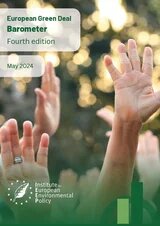European Green Deal Barometer 2024
Read the European Green Deal Barometer 2024 on the IEEP website.
The 2024 EU elections are considered by sustainability experts to negatively impact the European Green Deal implementation. However, these experts believe the agenda will be maintained by the new European Commission.
The fourth edition of the European Green Deal Barometer, IEEP’s annual survey which gathers sustainability experts’ views on the progress of the European Green Deal’s implementation, has released its full report, after presenting preliminary findings at the Think2030 Conference on 27 March 2024.
This comprehensive survey of 300+ experts reveals that 67% of respondents see the upcoming European elections having a negative impact on the implementation of the European Green Deal (EGD). According to the respondents, the EGD might lose its central position among EU policy, as its agenda is expected to be weakened or more constrained form. However, respondents do recognise its resilience even in the face of political shifts and in the long term; 55% of experts are confident that the European institutions will turn the Green Deal’s objectives into approved legislation and they consider increased climate mitigation and adaptation as the main opportunity arising from the delivery of these objectives. On the other hand, ‘insufficient commitment’ is seen as greatest obstacle for the EGD implementation, a longstanding concern among experts in previous editions of the Green Deal Barometer.
Looking at the national case studies, covering France, Czechia, Sweden, Spain and Poland, it appears that their national governments will commit to the continuation of the EGD agenda beyond the 2024 EU elections. In all these Member States’ experts, focusing on ensuring a just transition will help increase support for the Green Deal at national level.
Another part of the analysis looks at the influence that the Green Deal’s objectives may have on third countries, as well as the benefits and obstacles that may arise from its implementation. Almost all experts living outside the EU acknowledge positive impacts on a global scale, and they are likely to agree that the EGD presents both problems and opportunities.
The survey centred around a series of key policy questions assessing different policy areas within the European Green Deal agenda and its implementation.
- Climate mitigation and path to climate neutrality: Experts are divided on whether the target set for 2040 is sufficient for the EU to achieve the objectives of the Paris Agreement, with nearly half (47%) thinking that it is and a slightly lower proportion (43%) thinking it isn’t sufficient.
- Protecting and restoring ecosystems and biodiversity: Over two-thirds of experts believe the Nature Restoration Law will have a moderate-to-full impact (67%), on the restoration of biodiversity in the European Union.
Fair and sustainable food and farming system: Three-quarters (75%) believe that progress made since 2019 has been poor. Less than one in 10 (7%) believe progress has been good. Increasing financial support for farmers to transition towards sustainable agricultural practices (59%) is seen by the experts as one of the most necessary measures to achieve a more environmental and climate-friendly EU agriculture policy. - Supplying decarbonised, affordable and secure energy: Over a third (34%) believe that progress has been good, making this the one policy area where those with expertise are more positive than negative on the progress being made. However, only 1 in 10 (10%) experts think the current version of the Electricity Market Reform protects citizens from future energy crises or price spikes to a great extent/completely.
The full report of the European Green Deal Barometer includes a comprehensive list of recommendations for a more resilient and ambitious European Green Deal to ensure its continuation beyond 2024. The recommendations take into account the outcome of the discussions during the Think2030 biannual Conference.
The Green Deal Barometer 2024 report is available here.
The executive summary with an overview of the results is available here.
The European Green Deal Barometer is produced and published by the Institute for European Environmental Policy based on a survey conducted with the support survey contractor Savanta.
The Heinrich-Böll-Stiftung European Union supported the IEEP Barometer. The views and opinions in this publication do not necessarily reflect those of the Heinrich-Böll-Stiftung European Union.
Product details
Table of contents

